Amid the demand for a separate state for the Kuki-Zomi tribals in ethnic violence-hit Manipur, the ruling Mizo National Front (MNF) in Mizoram continues their campaign to establish a homeland for all the Zohnahthlak (Zo ethnic tribes) across the northeastern region.
Tribals belonging to the Kuki-Zo-Zomi community started trickling into Mizoram soon after the ethnic violence broke out in Manipur on May 3.
Mizoram currently houses over 12,000 displaced tribals, mostly Kuki-Zo-Zomi community people from Manipur.
The Chin-Kuki-Zo tribals and the Mizos in Mizoram belong to the Zo community and share the same culture and ancestry, besides, they are all Christians.
The Kuki-Chin community in Myanmar and Bangladesh also belongs to the Mizo community, which consists of different tribes, sometimes known as Zofate or descendants of Zo.
After Mizoram Chief Minister and MNF supremo Zoramthanga said that the question of unification of Mizo-Zo inhabited areas of Mizoram's neighbouring states to form one administrative set-up under the concept of “Greater Mizoram” is one of the demands of the MNF, other party leaders also launched a hectic campaign on the same line.
Mizoram Deputy Chief Minister Tawnluia has said that the formation of the MNF mainly aimed to establish a homeland for all the Zohnahthlak (Zo ethnic tribes) across the region.
“The MNF was established with the core values of keeping Mizo nationalism, preserving the rich culture, traditions and beliefs of the Mizos and advocating for an integrated and single administrative unit for the dispersed Zo ethnic tribes residing in the northeastern states of India, Myanmar and Bangladesh,” said Tawnluia, who is also MNF’s senior vice-president.
While addressing the party workers at the MNF's headquarters in Aizawl, the Mizo leader pointed out that the MNF is a party rooted in the principles of Mizo nationalism. No other political parties have Mizo nationalism enshrined in their constitutions.
Tawnluia, who had served as the 'Army chief' of the erstwhile banned militant outfit MNF, asserted that the MNF would strive to protect and promote Mizo cultures and religious beliefs, as enshrined in Article 371G of the Indian Constitution.
Article 371G of the Constitution deals with the special provisions for the state of Mizoram. This article was added by the 53rd Constitutional Amendment Act of 1986.
“If necessary, the MNF will fight relentlessly to keep the provisions of Article 371G in the Constitution,” he vowed.
Tawnluia highlighted that the 1986 peace accord between the MNF and the Indian government ensured the continuance of the Inner Line Permit (ILP) system, which is currently enforced in Mizoram to protect the demographic position of the indigenous people of the state.
"We should always bear in mind that the Peace Accord provides us with essential protections."
About the Uniform Civil Code (UCC), the MNF leader said that India is a secular nation, but the UCC has caused great concern among religious minorities.
In Mizoram, extensive consultations were held with the churches and civil society organisations, leading to the conclusion that the UCC, in its original form, cannot be accepted, he said.
After coming overground in 1986, the erstwhile militant outfit MNF was converted into a political party and was recognised as a state party by the Election Commission.
After the signing of the Peace Accord in 1986, ending two decades of strife and insurgency spearheaded by the MNF, Mizoram became the 23rd state of India on February 20, 1987.
Zoramthanga had earlier said that the concept of 'Greater Mizoram' was one of the demands of the MNF, and the issue was raised during the peace parleys with the Indian government before signing of the agreement 37 years ago.
“The unification of all ethnic Zo or Mizo tribes in India and bringing them under one administrative unit was one of the main aims of the founders of MNF, including Laldenga, who was the Chief Minister of Mizoram from August 1986 to October 1988,” he had said.
The Mizoram Chief Minister, however, said that the state cannot directly interfere in the internal affairs of Manipur on the issue of 'Greater Mizoram' or unification of Zo or Mizo tribal inhabited areas in Manipur with the state.
“The unification initiatives should come from ‘our kindred brothers’ in Manipur as the issue of unification of Chin-Kuki-Mizo-Hmar-Zomi tribes should not be imposed,” he had observed.
MNF leaders’ campaign for unification of Chin-Kuki-Mizo-Zomi came close on the heels of the separate administration demand, raised by 10 Kuki MLAs of Manipur (seven of them belong to the ruling BJP), the Indigenous Tribal Leaders’ Forum (ITLF) and the Kuki Inpi Manipur (KIM).
Home Minister Amit Shah and Manipur Chief Minister N. Biren Singh have on a number of occasions rejected the separate administration demand and categorically said that the territorial integrity of Manipur will be protected and under no circumstances it will be compromised.
Over 150 people have been killed and more than 600 have been left injured since ethnic violence between the Meitei and Kuki communities broke out in Manipur on May 3, when a 'Tribal Solidarity March' was organised in the hill districts to protest against the Meitei community's demand for Scheduled Tribe (ST) status.

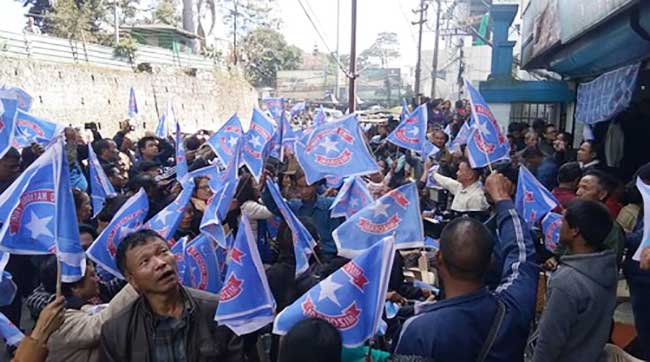
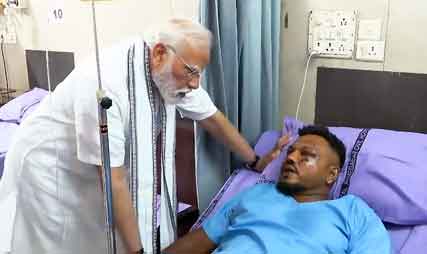
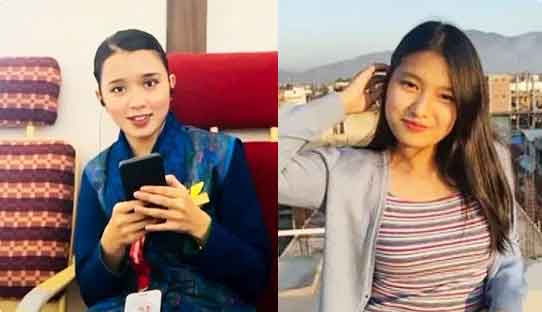
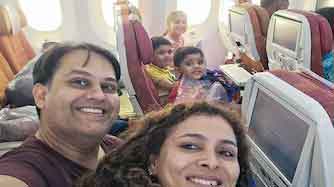
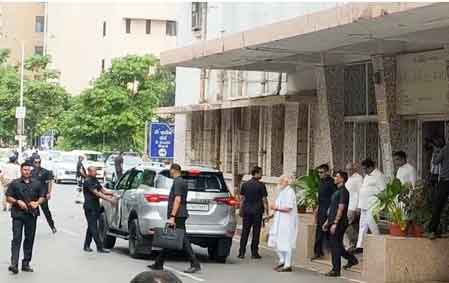
‘I can’t believe I survived’, says lone survivor of Air India crash in emotional meeting with PM Modi
Prime Minister Narendra Modi on Friday met Vishwash Kumar Ramesh, the sole survivor of the devastating Air India plane crash. Ramesh, a British national of Indian origin, is recovering from injuries sustained in the crash and is being treated at a hospital in Ahmedabad.
Ahmedabad crash: Two Manipuri crew members of London-bound Air India flight killed
Two cabin crew members from Manipur - Kongbrailatpam Nganthoi Sharma (20) and Lamnunthem Singson (26) – were killed when the London-bound Air India flight, carrying over 240 passengers, crashed shortly after taking off from the Ahmedabad airport.
Doctor couple’s dreams of new beginning in UK turned to ashes
A doctor couple’s dreams of a new beginning together as a family in UK turned into a nightmare and their last trip together as the ill-fated flight that was to take them to London crashed seconds after take-off on Thursday.
Air India plane crash: PM Modi visits Ahmedabad Civil Hospital, meets injured
Prime Minister Narendra Modi on Friday visited the Ahmedabad Civil Hospital, where he met those injured in the Air India plane crash.
India advises nationals in Israel to stay vigilant as Tehran-Tel Aviv tensions escalate
Amid escalating hostilities between Israel and Iran, the Embassy of India in Tel Aviv has issued an urgent advisory to Indian nationals currently in the country, urging them to stay vigilant, avoid non-essential movement, and follow local safety instructions.
241 dead, one survivor as Air India Dreamliner crashes after takeoff from Ahmedabad: Air India
In what is being described as one of the worst aviation disasters in Indian history, an Air India Boeing 787-8 Dreamliner carrying 242 people crashed shortly after takeoff from Ahmedabad airport.
Israel launches preemptive strikes on Iran, major explosion heard in Tehran
Israel launched major airstrikes against Iran in the early hours of Friday morning, significantly escalating tensions in the region and raising the specter of a broader conflict between the long-standing rivals.
CM Dr Manik Saha inaugurates developmental projects worth Rs 8 Cr in Khowai
Chief Minister Dr Manik Saha on Thursday inaugurated key developmental projects in Khowai worth Rs 8 Crore and said that the government is working consistently to improve infrastructure across all levels—from district and urban areas to village and panchayat regions.